In addition to our undergraduate qualifications we offer a large range of free courses and educational resources, including our suite of Badged Open Courses (BOCs).
These BOCs allow you to earn an Open University digital badge for each course you successfully complete. The badge can be displayed, shared and downloaded as a marker of your achievement and so they are perfect for continuing professional development (CPD) purposes. And they are free!
Each BOC comprises 24 hours of learning spread across 8 sessions which you can study at your own pace. We currently have seven sport and fitness related BOCs:
(1) Exploring sport coaching and psychology
Have you experience of sport or fitness coaching either as a participant or a coach? Are you inquisitive about how sport works behind the scenes? n this course you will explore the influence of coaching and psychology through the lens of sports people and teams who have been successful. You will focus on coaching practices used with young people and adults, including research and advice of leaders in their fields.
Content:
- Exploring sporting success
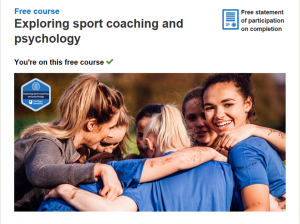
- Coaching children: fun and friendships
- Guiding teenagers towards success and life
- Comparing international level coaches
- Attitudes towards learning
- Psychological skills for life
- A fresh look at coaching
- The future of coaching
Author: Professor Ben Oakley
(2) Exploring communication and working relationships in sport
Are you experienced in sport or fitness, either as a participant or working in the sector, perhaps as a coach? Are you inquisitive about some of the hidden ‘people skills’ that seemingly make some people particularly credible in their role? In this course, you will boost your ability to vary your communication approach according to the situation and the needs of the people involved.
Content:
- The purposes of communication
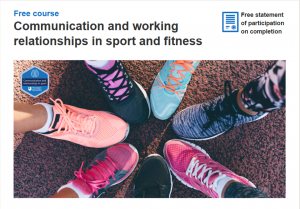
- Getting your message across
- How can you enhance relationships?
- Connecting with others
- Becoming more influential
- When does harsh feedback become bullying?
- Power and the communication process
- Topical aspects of communication
Author: Professor Ben Oakley
(3) Coaching others to coach
Are you responsible for helping coaches to learn and develop? Do you consider yourself a coach developer, a coach educator, mentor, tutor or somebody who just wants to support coaches and enable them to become the best coach they can be? This course is designed to support people like you. It is a course dedicated to developing the people who develop the coaches.
Content:
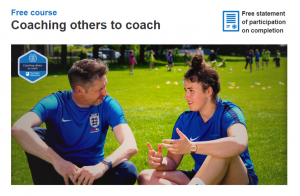 What do coach developers do?
What do coach developers do?- How do coaches learn?
- How do you build effective learning relationships?
- Developing your coach developer self-awareness
- Your teaching repertoire
- Asking good questions
- Effective observations and feedback
- Coach development for the digital age
Authors: Dr Alex Twitchen and Professor Ben Oakley
(4) Exploring the psychological aspects of sport injury
Sport injury is relatively common among sport and exercise participants, and while the physical impact of injury is often easy to recognise, the psychological impact is often less understood. In this course you will examine the relationship between injury and psychological factors, looking at the link between injury and psychology at two distinct points – before an injury has occurred and then following an injury.
Content:
- Sport injury and psychology – what’s the link?
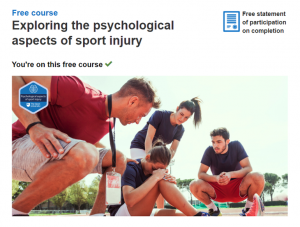
- A holistic approach to sport injury
- Can psychological factors increase the risk of injury?
- What psychological interventions can be used to prevent sport injury?
- Psychological responses to sport injury
- What impact can psychological responses to injury have?
- Sport injury treatment: how can imagery, self-talk and relaxation help?
- Sport injury treatment: how can goal-setting and social support help?
Author: Dr Caroline Heaney
(5) Learning from burnout and overtraining
Have you experience of sport or fitness training either as a participant, coach or a parent supporting your child? Are you inquisitive about the impact of committed involvement in sport or exercise training on the individual? In this course you will explore a number of examples of sports people who have thrived and those who have experienced burnout. By exploring burnout you will gain a deeper understanding of the physical and mental aspects of sport such as athletic identity, overtraining and perfectionism.
Content:
- What is burnout?
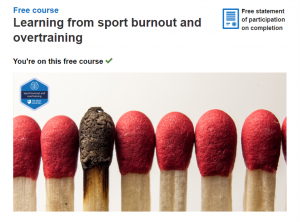
- Perspectives of burnout
- Exploring identity and overtraining
- Insights into overtraining
- What role does motivation and perfectionism play?
- Coaches and burnout
- Managing those on a burnout path
- Strategies to reduce burnout
Author: Professor Ben Oakley
(6) The athlete’s journey: transitions through sport
Are you a coach working with athletes of different ages? Are you a parent whose child has shown potential in sport? Perhaps you are an athlete looking ahead at your potential journey and choices through and beyond the sporting pathway? Whatever your involvement in sport, this course will help you understand the journey an athlete undertakes during their career, whether as a professional or recreational athlete, and the nature of support they may need at different times.
Content:
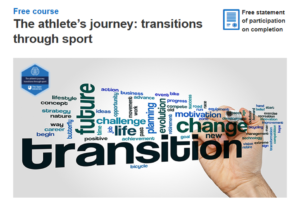 The athlete’s journey – what are career transitions in sport?
The athlete’s journey – what are career transitions in sport?- Influencing factors – key themes in the athlete’s journey
- Out of the blocks – preparing athletes for career transitions
- Keeping going – expected transitions in sport
- Stopped in your tracks – unexpected transitions in sport
- Spotlight – parenthood and sport
- The final athletic chapter – retirement from sport
- Moving on – life after sport
Authors: Candice Lingam-Willgoss and Caroline Heaney
(7) Supporting female performance in sport and fitness
Do you support women’s performance in sport or fitness as a coach or parent? Are you a female athlete who wants to optimise your performance using recent research insights? If so, then this course is for you. It addresses the problem of sports science research traditionally being male dominated and the assumption that if it works for men then it must work for women. It allows you to explore specific female physiological and psychological topics such as relationships between the menstrual cycle, breast support, pelvic floor health and physical performance.
Content:
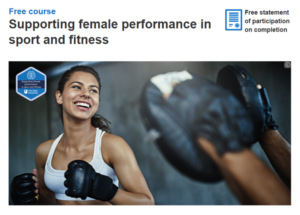 Mind the gap: gender differences in sport science research and its impact on female athletes
Mind the gap: gender differences in sport science research and its impact on female athletes- Demystifying the menstrual cycle
- Hormonal contraception: a solution or more challenges?
- Pelvic floor muscles: out of sight and often overlooked
- Breast health and choosing the correct breast support
- Injuries and the female athlete
- Low energy intake and missed periods: the risks
- Effective support of female athletes
Authors: Simon Rea, Jess Pinchbeck and Emma Ross
